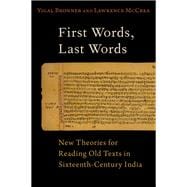First Words, Last Words charts an intense "pamphlet war" that took place in sixteenth-century South India. Yigal Bronner and Lawrence McCrea explore this controversy as a case study in the dynamics of innovation in early modern India, a time of great intellectual innovation. This debate took place within the traditional discourses of Vedic Hermeneutics, or Mima?sa, and its increasingly influential sibling discipline of Vedanta, and its proponents among the leading intellectuals and public figures of the period.
Bronner and McCrea examine the nature of theoretical innovation in scholastic traditions by focusing on a specific controversy regarding scriptural interpretation and the role of sequence-what comes first and what follows later-in determining our interpretation of a scriptural passage.
Vyasatirtha and his grand-pupil Vijayindratirtha, writers belonging to the camp of Dualist Vedanta, purported to uphold the radical view of their founding father, Madhva, who believed, against a long tradition of Mima?sa interpreters, that the closing portion of a scriptural passage should govern the interpretation of its opening. By contrast, the Nondualist Appayya Dik?ita ostensibly defended his tradition's preference for the opening. But, as this volume shows, the debaters gradually converged on a profoundly novel hermeneutic-cognitive theory in which sequence played little role, if any.
First Words, Last Words traces both the issue of sequence and the question of innovation through an in-depth study of this debate and through a comparative survey of similar problems in Judaism, Christianity, and Islam, revealing that the disputants in this controversy often pretended to uphold traditional views, when they were in fact radically innovative.








